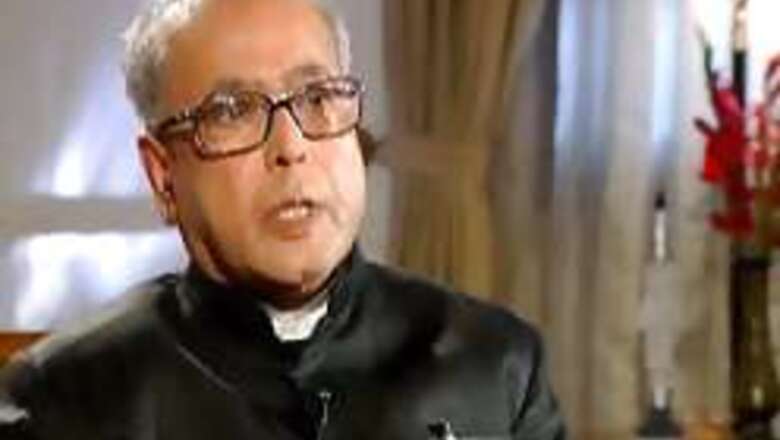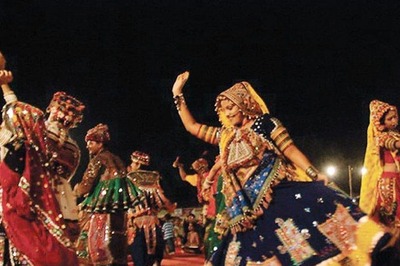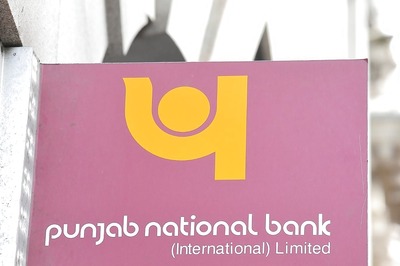
views
Washington: Calling Pakistan a "nursery of global terrorism", India has asked Pakistan once again to stop all cross-border terrorism as promised and dismantle the infrastructure of terrorism still intact on its soil.
While the fragile political fabric of states in Pakistan is a source of continuing anxiety to India, Pakistan remains a nursery of global terrorism, visiting Defence Minister Pranab Mukherjee said in a talk on Monday at Harvard University in Boston.
"Post 9/11, Pakistan has reportedly helped the US to fight terrorism along its western border with Afghanistan. But it has done precious little to dismantle the infrastructure of terrorism on its eastern border with India," he said in his talk on 'India's Strategic Perspective'.
Many terrorists roam freely in Pakistan. India has repeatedly stated that, in order to proceed with the ongoing peace-process between the two countries, Pakistan must implement the solemn assurances it has given to stop all cross-border terrorism, he said noting that "This has not yet happened".
If Pakistan claims to be a frontline state in the global war against terrorism, then it must do much more to dismantle the infrastructure of terrorism still intact on its soil, Mukherjee said welcoming the recent Havana accord between the two countries to set up an institutional mechanism to tackle cross-border terrorism.
The rise of religious fundamentalism and terrorism is today one of the gravest security challenges to states, economies, peoples and democratic polities, he said adding, "It has been starkly etched in our memory by the recent Bombay (Mumbai) blasts, the London, Madrid and Bali bombings, and of course, the traumatic terrorist attack on the US five years ago."
Putting terrorism at the top of India's six principal security challenges, Mukherjee said India has suffered the most gruesome and repeated acts of terror since the late 1970s - first in Punjab, then in Jammu and Kashmir, and in recent years in many other parts of the country.
The Mumbai blasts of 1993 were the original act of mass terrorism. India's places of worship, symbols of its rapid economic growth, its prestigious centres of learning, popular shopping complexes and symbols of its vibrant democracy have all been systematically targeted, he said.
While in most parts of the world, terrorism is perpetrated by non-state actors, in India it is sponsored and supported by state agencies from a hostile neighbourhood, Mukherjee said in another obvious reference to Pakistan.
The second challenge in his view was that India which has had to fight three wars on its western borders and one in the north since independence continues to face a proxy war from across its western border, he said in another obvious reference to Pakistan.
"Its unresolved territorial and boundary issues with neighbours persist" he noted.
Contd on page 2…
PAGE_BREAK
Thirdly, India has been placed in an arc of proliferation activity running from east to west, which has had an adverse impact on its security situation. The possibility of linkages between proliferation of weapons of mass destruction and terrorism, which has emerged in recent years, is of great concern for India, Mukherjee said.
Fourth, on India's northern border, Nepal has been ravaged by Maoist insurgency for many years. Mounting religious extremism in Bangladesh, coupled with illegal migrations, are a source of considerable concern for India, he said.
In Sri Lanka, the two-decade-old ethnic strife has grave political, economic and humanitarian ramifications for India. Thus, developments in these states may pose risks to India and undermine the stable and peaceful environment that India seeks for its own economic growth.
Fifth, India sits astride the Indian Ocean. The security of the entire region from East Africa to Southeast Asia is increasingly challenged by the rising incidence of violent conflict, growing fundamentalism and terrorism, Mukherjee said.
It is also affected by trafficking in arms, drugs and human beings as well as piracy. Sixty thousand ships carry merchandise and energy from the Gulf to East Asia through the Straits of Malacca every year. Therefore, maritime security is a major preoccupation for India as it is for other littoral states in the Indian Ocean.
Sixth, with the Indian economy set on a higher growth trajectory, its demand for energy is, and will be, increasing rapidly. In this context, energy security and security of sea lanes of communication, on which India's trade is dependent, assume significance.
In order to meet the challenges that India faces, it has been focusing on inclusive economic development, strengthening of its defence to deter aggression; ensuring stability and peace in its neighbourhood; developing friendly and mutually beneficial ties in its extended neighbourhood like West, Central and Southeast Asia; and establishing strategic partnerships with all the major actors in the world, particularly the US, EU, Russia, China and Japan.
Building strong and cooperative relations with the US is one of the fundamental goals of India's current foreign and security policy, Mukherjee said noting that the growing warmth between the two countries is based on shared values and common concerns.
The US remains the dominant global power and central to peace, prosperity and security of the world. India believes that the emerging ties with the US in trade, investments, technology, defence, energy, non-proliferation, and counter-terrorism would have a major impact not only in the bilateral domain but also in a global perspective.
"Our partnership will also help shape global norms and institutions that are universally accepted and democratic. Clearly, Indo-US relations are set to emerge as one of the fundamental inter-state ties of the 21st century," he said.
In this context, the decision of President George W Bush and Prime Minister Manmohan Singh to address the shared challenge of energy security by engaging in full civil nuclear energy cooperation is a welcome departure from the era of technology denial regimes imposed on India, Mukherjee said.




















Comments
0 comment